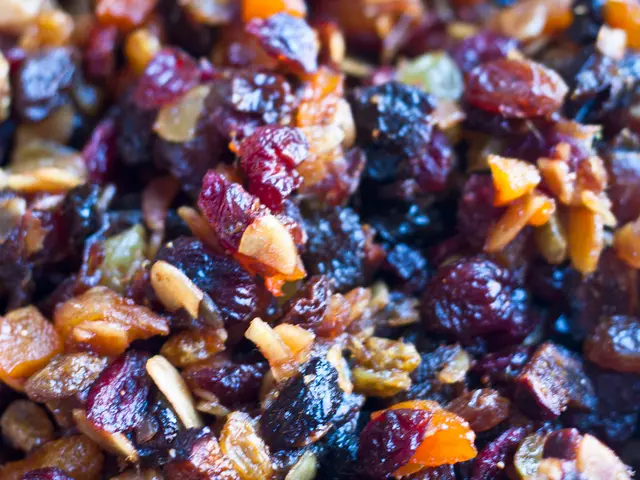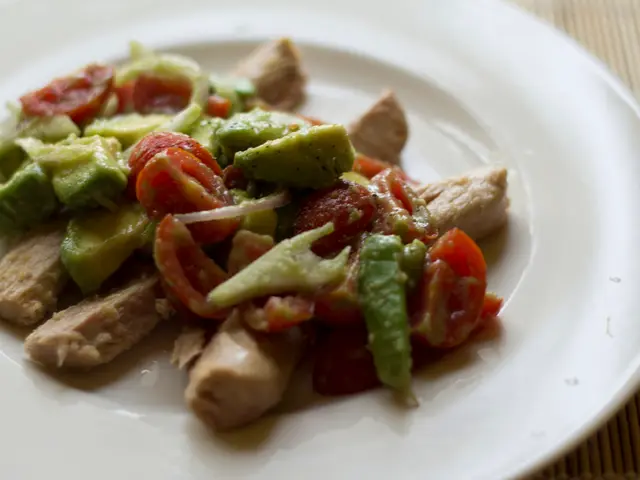Cracking the Blood Pressure Code with Food: A Guide for Those in Need
Essential Kitchen Items for Blood Pressure Reduction You Should Keep at Home
if you're grappling with high blood pressure, revamping your diet is an effective way to tackle this issue.
As the World Health Organization (WHO) explains, the danger lies in unhealthy diets, loaded with salt, saturated fats, red meats, and so on[1]. Hypertension—or high blood pressure—happens when the small veins responsible for regulating blood flow in the body narrow excessively, forcing the heart to work harder to pump blood through[2]. This leads to an increase in blood pressure, making the heart work harder and potentially leading to health complications if not controlled[2].
With around 1.28 billion adults aged 30-79 suffering from hypertension worldwide, most in low- and middle-income countries, it's crucial to take charge of your cardiovascular health[1]. Moreover, around 40% of these individuals are unaware they have high blood pressure[1].
Experts recommend a couple of lifestyle changes to keep blood pressure in check, and a significant one involves maintaining healthy eating habits[3]. The British Heart Foundation highlights the importance of including fruits, nitrate-rich vegetables, whole grains, lean proteins, and low-fat dairy products[3].
Conversely, there are some foods to avoid entirely (or at least moderate) when dealing with high blood pressure[3].
- Salt: Staple in many diets, but also a major risk factor for hypertension[3]. Aim to consume less than 6g per day, or about one teaspoon[3]. bear in mind that many processed products contain hidden sodium.
- Sugary foods: offering few health benefits and negatively affecting the cardiovascular system, sugar-packed products include granola bars, processed desserts, crackers, peanut butter, and sweetened beverages[3].
- Foods with saturated fats: Linked to weight gain and associated with the risk of developing high blood pressure[3], saturated fats are found in processed meats like sausages, burgers, and bacon, sweets like chocolate, candies, cakes, and puddings, cooking fats, coconut and palm oil, and whole milk dairy products[3].
- Red meats: Eating red meat can produce compounds that raise blood pressure[3], so limit consumption to moderate quantities: beef, lamb, pork, veal, venison, and goat[3].
- Sauces and dressings: High in sodium, avoid these frequently: ketchup, chili sauce, soy sauce, salad dressings[3].
By adhering to these recommendations, you'll be well on your way to balancing your blood pressure and preventing dangerous cardiovascular diseases.
P.S. Want to dive deeper? Check out the latest insights on healthy eating habits from the Universal Health Magazine and other key sources[4][5].
Oh, and remember: being informed is the first step toward a healthier life!
References:
- The World Health Organization.
- Texas Heart Institute.
- British Heart Foundation.
- CDC.
- Mayo Clinic.
- To maintain a healthy blood pressure, one should focus on a diet rich in fruits, nitrate-rich vegetables, whole grains, lean proteins, and low-fat dairy products, as recommended by the British Heart Foundation.
- Conversely, avoiding foods high in salt, sugar, and saturated fats, such as processed meats, sweets, and sauces, is crucial for those struggling with high blood pressure.
- For a balanced diet that promotes overall health and wellness, consider incorporating the latest nutrition insights found in health and wellness publications like the Universal Health Magazine.








